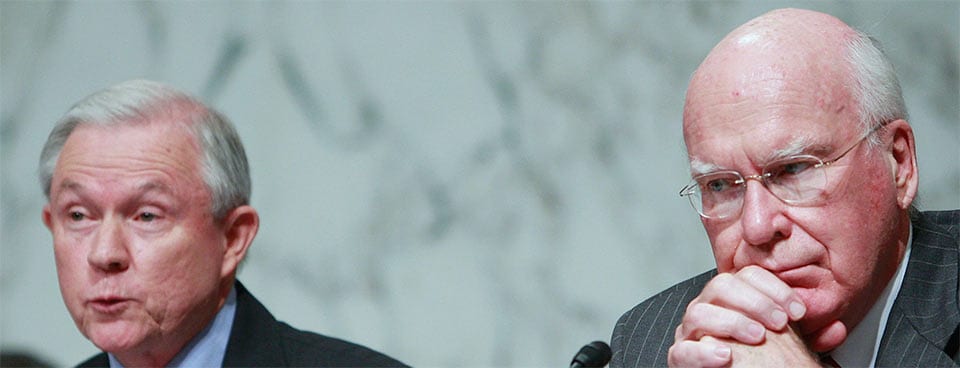 By Andrew Cohen
By Andrew Cohen
As a high school student in suburban Washington, D.C., Anne Joseph O’Connell “became fascinated” with the Washington Post’s federal page. It marked the comings and goings of government leaders, and ignited an interest that resonates today.
Now a Berkeley Law professor, O’Connell again keeps a watchful eye on federal employees, and what she sees concerns her. A leading authority on federal agencies, O’Connell has been tracking the sharp increase of failed nominations and delayed confirmations across recent presidential administrations—and the impact it has on the workings of government. Her latest research, captured in an eye-opening Duke Law Journal article, is generating significant buzz in policy and academic circles.
“It answers many important questions, but it raises far more questions that legal scholars and political scientists need to explore,” wrote Richard Pierce, an administrative law professor at George Washington University. “I would urge anyone who is interested in public law and the political process to put it on her ‘must read’ list.”
The nomination failure rate and the time required for confirmation have risen dramatically. President Obama’s nomination failure rate—nominations that were returned to him or were withdrawn—was 28 percent through 2014, much higher than the 17 percent failure rate for President George H.W. Bush. The average confirmation time in Obama’s administration has been 127.2 days, more than twice as long as President Reagan’s nominees.
Lamenting the problematic lag time between vacancy and confirmation, the United States D.C. Circuit Court of Appeals recently cited a 2010 report by O’Connell in SW General, Inc. v. National Labor Relations Board.
“Incredibly important policy positions are often not filled,” said O’Connell, Berkeley Law’s George Johnson Professor of Law and past associate dean for faculty development and research. “If they’re not staffed by people vetted by the president and confirmed by the Senate, that’s a loss. Like many others, I’m worried about the functioning of modern government, which relies heavily on administrative agencies to do its work.”

In a previous study, O’Connell found that senior executive agency positions were not staffed with a Senate-confirmed appointee between 15 and 25 percent of the time, on average, between 1981 and 2004. Acting officials often step into these vacancies, but that option is not open for the top jobs at independent regulatory commissions, such as the National Labor Relations Board.
In late 2013, a Senate rule change lowered the threshold to vote on a nomination from a 60 percent cloture vote to a simple majority. While that reduced the percentage of failed nominations for judgeships and the average time for judicial nominees to be confirmed in the following year, confirmation delays for agency nominees—and the failure rate for some categories of agencies—increased.
Where it’s gone wrong
“Growing acrimony between Democrats and Republicans has certainly been a catalyst for the rise in ‘failed’ nominations and appointment delays,” said O’Connell, who has won multiple national awards for her scholarship on administrative law. “But there are also other factors at work.”
O’Connell said nominations are sometimes slow to come out of the White House, and the clunky appointments process asks for duplicative information. What’s more, new agency leaders are often not prepared to transition from the private sector and receive insufficient training—leading to greater turnover, and a shrinking geographical pool for viable candidates.
“The White House needs a strong and committed personnel office to process nominations quickly, particularly at the start and end of an administration,” she said. “There also needs to be a manageable process that doesn’t require nominees hiring private lawyers to fill out the paperwork. And successful nominees need adequate training. They may come from a Fortune 500 company or an elite university, but they often haven’t dealt with congressional committees or the White House budgeting process.”
Nearly 30 percent of nominees to agency positions live in the Washington, D.C. area when nominated. The increased time required for confirmation has seemingly deterred potential candidates outside the Beltway.
“The net result is that we’re limiting the pool of people who can take these positions,” said O’Connell, who won Berkeley Law’s Rutter Award for Teaching Distinction in 2012. “That’s not ideal because you end up with a pretty homogenous group of Washington insiders.”
O’Connell recommends trying to secure 2- or 4-year commitments from potential candidates, and believes the Senate should impose confirmation deadlines for nominations to critical positions in sensitive areas such as national security, as the 9/11 Commission recommended.
Last year, O’Connell was appointed to the Administrative Conference of the United States, an independent federal agency dedicated to improving regulatory procedures. She applauds a recent statute eliminating the confirmation requirement for 200 non-senior agency positions—and calls for other positions to join that list.